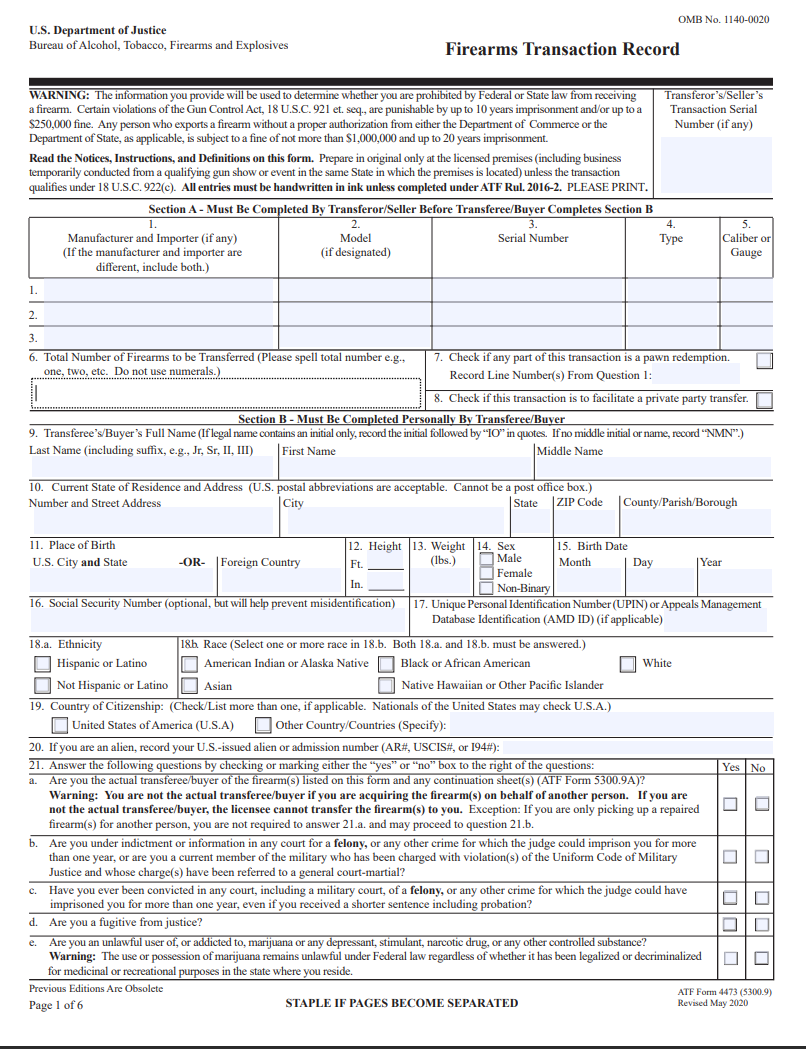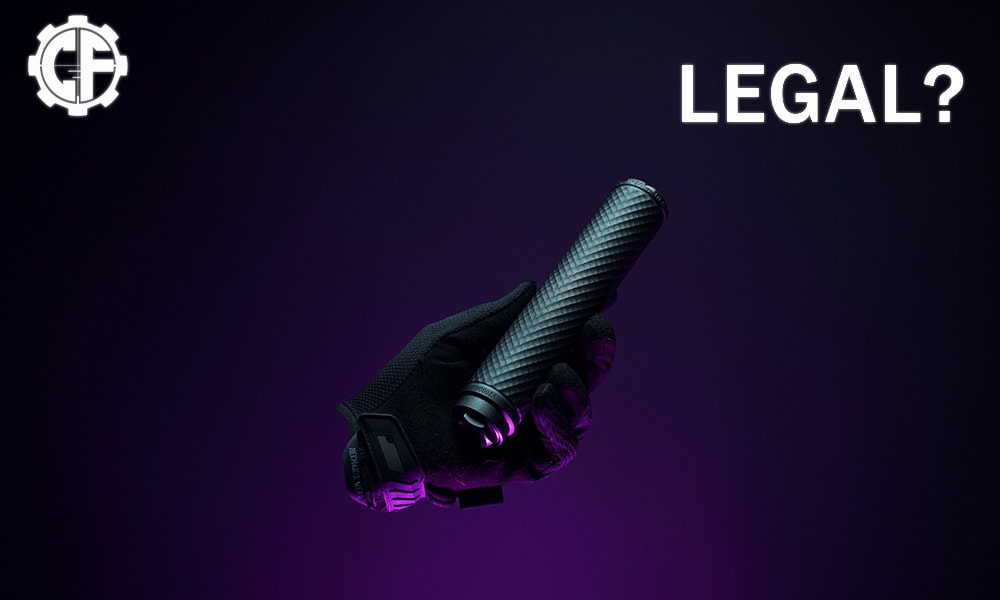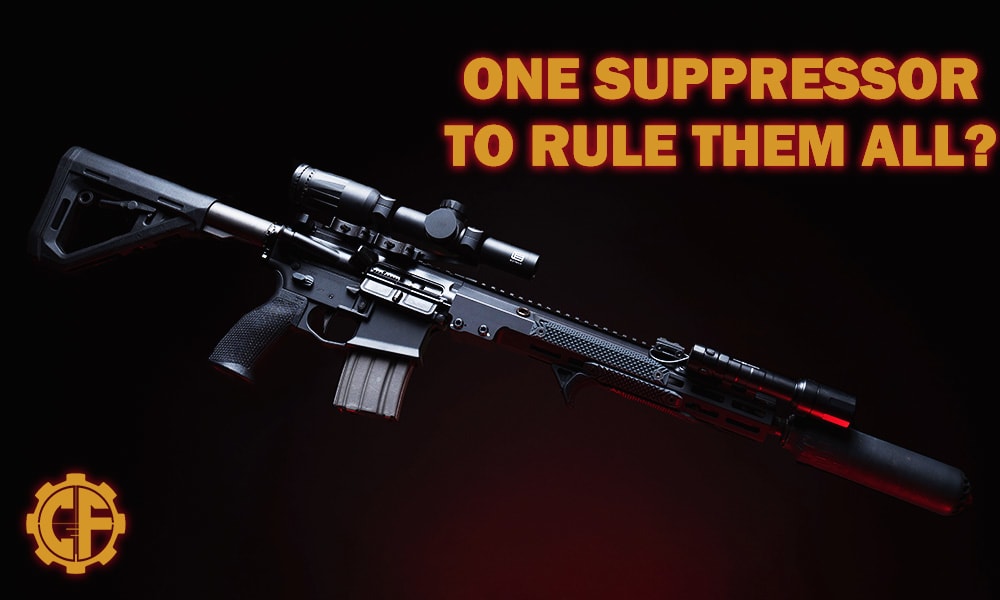- The warning at the top of the form now includes information about illegal exportation.
- Information on the firearm/s to be transferred is now Section A, which must be completed before the transferee completes Section B.
- The "County" block has been changed to "County/Parish/Borough" to accommodate Louisiana and Alaska, respectively.
- A new item, (26c.), has been included for the recording of official military orders establishing a permanent change of station.
- Item 26b, which previously applied to situations in which the identification document did not show the current residence address of the transferee, has been updated to include situations in which the identification document does not include the full legal name of the transferee.
- Relocated questions relating to the manufacturer, importer, model of firearm, caliber, gauge, type, serial number, and the number of firearms to be transferred to a new Section A at the beginning of the form. These questions were previously located in Section D.
- New options for questions relating to personal information, such as the option to select non-binary as a Sex, the option to include an Appeals Management Database Identification (AMD ID) as a Unique Personal Identification Number, and two new immigration-based questions.
- Additional criminal history questions relating to dealings with a military court, misdemeanor domestic violence offenses, and orders of protection.

ATF Form 4473
THE SEASON OF GIVING
The season of giving is upon us, and firearms make the best gift, hands down. BUT be careful! There are some things that you need to understand about #1 - The Law and #2 - How to correctly fill out this type of transaction on your ATF Form 4473. This is one area of the 4473 that is typically confusing, especially during the holidays. The question on Form 4473 asks if you are the person that is actually the one that is buying or physically taking possession of the firearm (referred to as the transferee). It does seem like an odd question since you are the one filling out the form, but the intent is to single out those who are illegally buying guns for others. The error comes when people think that they are honestly buying the gun as a legal, and legitimate gift, and mark "no". Marking "NO" is wrong! As far as Form 4473 is concerned, ATF defines it: Actual Transferee/Buyer: For purposes of this form, you are the actual transferee/buyer if you are purchasing the firearm for yourself or otherwise acquiring the firearm for yourself (e.g., redeeming the firearm from pawn/retrieving it from consignment, firearm raffle winner). You are also the actual transferee/buyer if you are legitimately purchasing the firearm as a gift for a third party.
Century Arms VSKA T.R.P AK-47
If you are still confused, refer to the below example: ACTUAL TRANSFEREE/BUYER EXAMPLES: Mr. Smith asks Mr. Jones to purchase a firearm for Mr. Smith. Mr. Smith gives Mr. Jones the money for the firearm. Mr. Jones is NOT THE ACTUAL TRANSFEREE/BUYER of the firearm and must answer "NO". The licensee may not transfer the firearm to Mr. Jones. However, if Mr. Brown goes to buy a firearm with his own money to give to Mr. Black as a present, Mr. Brown is the actual transferee/buyer of the firearm and should answer "YES". However, you may not transfer a firearm to any person you know or have reasonable cause to believe is prohibited under 18 U.S.C. § 922(g), (n), or (x). It boils down to, if you are buying a gun as a gift and in a way that is legal in your state, go ahead and check "yes".
STRAW PURCHASES
You may have the best of intentions when shopping for firearms as gifts this Christmas, but be very careful! Don't get yourself caught up in a straw purchase. In closing, let's take just a moment to define what a straw purchase is. A straw purchase is any purchase in which a second person agrees to acquire a firearm for someone who is ineligible to purchase the firearm for himself. A straw purchaser can be identified as a person with a clean background who purchases firearms specifically on behalf of a person prohibited from purchasing a firearm because that prohibited person is a convicted felon, domestic violence misdemeanant, juvenile, an individual who has been adjudicated mentally ill or one who is prohibited for other federally or state-defined reason from purchasing or possessing a firearm. In the U.S, a purchaser of a firearm from an FFL who lies about the identity of the ultimate possessor of the gun can be charged with making false statements on a Federal Firearms Transaction Record. Further, it is illegal for any person not in possession of an FFL to purchase a firearm with the intention of resale. (NSSF)WRAPPING THIS UP!
Don't get confused when filling out the new form. Be sure to read the question before you fill out the field for your answer. The location of certain questions may have changed, or additional wording may have been added, but it is still a Form 4473, and is relatively easy to understand and fill out. Shop All Long GunsShop All Handguns
Shop All Ammunition








